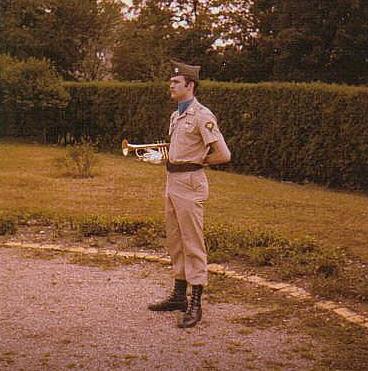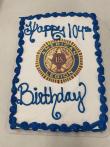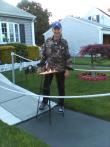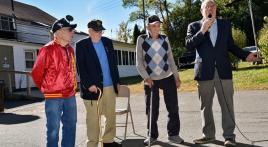I grew up in central Florida and enlisted in the U.S. Army at the age of 17 in March 1974 on the delayed entry program. At the entrance processing center in Jacksonville, Fla., I was asked what my MOS preference was. “Journalism,” I responded. The specialist typed a few commands into a teletype terminal, glanced at the response and stated, “Sorry. There are no openings. What else were you thinking?” “Okay, how about MP?” I asked. He glanced at my paperwork and said, “Sorry, you have to be 18. Anything else?” “No. I hadn’t thought that far.” So he looked at my paperwork again, specifically reviewing my entrance-exam test scores. “I got a guy you need to talk to,” he said. So the next thing I knew, I was in a 10’ x 20’ 1970s wood-paneled room with a desk, a U.S. Army flag and the American flag on either side behind it, a large circular U.S. Army seal on the wall behind it, and an E-7 with a chest full of medals pacing back and forth between me and the desk who stated in a graveled and gruff voice, “Son. You want to be an Electronic Warfare Cryptologic Traffic Analyst.” “What’s that?” I asked. “I can’t tell you,” he responded, “It’s secret.” “Where do I sign?” I asked without hesitation … and the next thing I knew I was a member of the Army Security Agency (ASA … which later became the Intelligence and Security Command - INSCOM).
When I arrived at Fort Jackson, S.C., two weeks to the day following my graduation from high school in June of the same year, I knew that things were going to be a little different for me as all of my issued uniforms already had the ASA unit patch sewn on and I was issued MI brass as well. No one else in my basic training unit had a direct assignment, and I was informed by one of our drill sergeants that this was the first unit that they were training that had zero draftees. So, having enlisted on the delayed entry program three months earlier, I had already received an automatic promotion to E-2 and was lucky enough to be selected as a squad leader as a result. So no KP for me.
After basic training, I was assigned to Fort Devens, Mass., for AIT. Here I learned the basics of identifying and analyzing intercepted radio traffic. Fort Devens was an interesting place at an interesting time in my life. Although I could drink legally at 17 in the EM club, I turned 18 while at Devens and was able to consume alcohol off-post as well (18 being the age of majority for alcohol consumption at the time). I also experienced my very first snowfall here (having been born and raised in central Florida). While at Devens, I had surgery for a pilonidal cyst … not a real big deal, but it did give me 30 days' convalescent leave prior to travelling to my permanent party station.
Next stop: the U.S. Army Security Agency Field Station Augsburg in Augsburg, Germany. Upon arrival I was informed that the field station was over strength in my MOS. So they strapped a .45 on my hip, a brassard on my shoulder, and “Viola!” I was an MP for the next 90 days. (I could have saved you guys a lot of trouble here, I thought.) So, following this short detour I was finally assigned to my permanent duty section and served as a floor analyst in one of the intercept bays as well as being assigned as a full-time analyst on the Czechoslovakian Air/Air Defense team. The Vietnam War itself had ended almost simultaneously upon my arrival in Germany, but we were still at war on a daily basis with the Eastern Bloc. The atmosphere at work was pretty intense at times, especially when the Warsaw Pact countries were conducting exercises. The operations center was a 45-minute bus ride from the barracks, but we would sometimes spend days on end in operations, taking short naps when possible, while Warsaw Pact exercises were being conducted. Since they were often conducted on or extremely close to the Czech/West German border, we never knew if this was going to be “the real thing” or not. They were extremely exciting and tense times.
While stationed in Germany I took the Warrant Officer Flight Aptitude Selection Test, was accepted and received orders to attend helicopter flight school to become a pilot. However, my class date was a little over a year away. This was good news as the flight section at work gave me an open invitation to fly with them any time I was off from work, and I took extensive advantage of this offer, flying all over Germany in UH-1s. I was really looking forward to learning to fly. However, shortly prior to my class date (which was about the same time as my ETS date) my father (a general contractor and builder of commercial buildings) convinced me to leave the service and come to work with him. His intention was to send me to school while grooming me to take over the family business. Unfortunately, my dad suffered a heart attack and passed just 6 short months after my separation from the service. That pretty much ended my construction and contracting future.
Even though I was 3-in-and-out, I am proud of my service. From that service I acquired a lifetime of friends and brothers. I attribute much of my success in both business and life to the work ethic instilled at that young age. We played hard, we worked hard, we did whatever was necessary to accomplish mission goals without regard to personal wants and needs. I remain very active in the ASA/INSCOM community and attend reunions several times annually. In conjunction with a couple of other brothers, and with a final review that included a few changes made by one of our former commanders (a retired major general and member of Military Intelligence’s “who’s who”), I also produce the Field Station Augsburg Challenge Coin (http://www.fsachallengecoin.com). The proceeds from the sale of this coin allow me to give large quantities of them away to reunion committees for raffles and other fundraising activities.
I could go on and on. I often wish that I’d remained in the Army and wonder what life would have been like as a military pilot. However, I would not have met my wife of 35 years had that occurred. It’s funny how life plays out, especially when you look back and think of all the zigs and zags that could have been. Still, I have no regrets.

Each unit on our Kaserne was assigned a week of flag detail. This only happened once for our unit in the 2½ years I was there. Even though we were an MI unit, our commander (Major Babich) was an easygoing but gung-ho kind of guy. I knew the entire cadre on a personal level and was always “in the right place, at the right time.” When we were assigned flag detail I asked Major Babich if he’d like to have a live bugler. This was something that no other unit had ever provided (including all of the tankers, artillery and other units) and the bugle calls were played via a record on a PA system. I thought the major was going to have a cow right there on the spot. So, for the next week we marched in formation (the ONLY time we ever had any sort of formation the entire time I was stationed there) down to the Kaserne flagpole and I played First Call/Reveille, Retreat and To The Color for the raising and lowering of the flag. Major Babich was beside himself.
Legionnaire Al Hays tells his story
Royse City, TX
February 21, 2018
Submitted by:
Jason Castleberry




